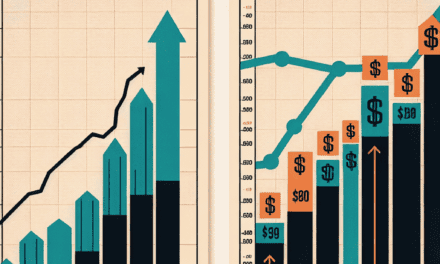“Citi Lowers Masco Price Target to $77: A Shift in Market Outlook.”
Introduction
Citi has revised its price target for Masco Corporation, lowering it from $82 to $77. This adjustment reflects changes in market conditions and the company’s performance outlook. Analysts at Citi have reassessed various factors influencing Masco’s business, including economic trends, competitive landscape, and financial metrics, leading to this updated valuation.
Citi’s Price Target Adjustment for Masco
Citi has recently announced a reduction in its price target for Masco Corporation, adjusting it from $82 to $77. This decision reflects a recalibration of expectations regarding the company’s performance in the current market environment. Analysts at Citi have cited various factors influencing this adjustment, including shifts in consumer demand, fluctuations in raw material costs, and broader economic indicators that may impact the home improvement sector.
The home improvement industry has experienced significant volatility in recent years, driven by changing consumer behaviors and economic uncertainties. As a result, companies like Masco, which specializes in home improvement and building products, must navigate a complex landscape. Citi’s analysts have noted that while Masco has historically demonstrated resilience, the current economic climate presents challenges that necessitate a more cautious outlook. This adjustment in the price target is not merely a reflection of Masco’s internal performance but also an acknowledgment of the external pressures that could affect its future growth.
Moreover, the reduction in the price target comes at a time when many companies in the sector are grappling with rising costs associated with materials and labor. These increased expenses can erode profit margins, making it essential for companies to adapt their strategies accordingly. Citi’s analysts have emphasized the importance of monitoring these cost dynamics, as they play a crucial role in shaping the financial outlook for Masco and its peers. By lowering the price target, Citi aims to provide a more realistic assessment of Masco’s potential in light of these ongoing challenges.
In addition to cost pressures, the analysts have pointed to the potential impact of interest rate fluctuations on consumer spending. Higher interest rates can dampen consumer confidence and reduce discretionary spending, particularly in the home improvement sector, where purchases are often significant investments. As consumers become more cautious in their spending habits, companies like Masco may face headwinds in achieving their sales targets. Consequently, Citi’s revised price target reflects a prudent approach to forecasting Masco’s performance amid these economic uncertainties.
Furthermore, it is essential to consider the competitive landscape in which Masco operates. The home improvement market is characterized by a diverse array of competitors, each vying for market share. As companies innovate and adapt to changing consumer preferences, Masco must remain agile to sustain its position. Citi’s analysts have highlighted the importance of strategic initiatives and product differentiation as key factors that could influence Masco’s ability to navigate this competitive environment successfully.
In conclusion, Citi’s decision to lower Masco’s price target from $82 to $77 underscores the complexities facing the home improvement sector. By taking into account various economic factors, including rising costs and shifting consumer behavior, Citi aims to provide a more accurate reflection of Masco’s potential in the near term. As the company continues to adapt to these challenges, stakeholders will be closely monitoring its performance and strategic initiatives. Ultimately, this adjustment serves as a reminder of the dynamic nature of the market and the importance of maintaining a flexible approach in response to evolving conditions.
Implications of the New $77 Price Target
Citi’s recent decision to reduce the price target for Masco Corporation from $82 to $77 carries significant implications for investors and stakeholders alike. This adjustment reflects a recalibration of expectations regarding the company’s future performance, particularly in light of evolving market conditions and economic indicators. As analysts reassess their outlooks, it becomes essential to understand the factors that contributed to this downward revision and what it may mean for Masco’s trajectory moving forward.
Firstly, the reduction in the price target suggests that Citi anticipates a more challenging environment for Masco, which operates in the home improvement and building products sector. The housing market, a critical driver of Masco’s business, has shown signs of slowing down, influenced by rising interest rates and inflationary pressures. These economic factors can dampen consumer spending and affect home renovation projects, which are vital for Masco’s revenue streams. Consequently, a lower price target may indicate that analysts expect a decline in sales growth or profitability in the near term.
Moreover, this adjustment may also reflect broader trends within the industry. As competitors adapt to changing consumer preferences and economic realities, Masco must navigate these challenges to maintain its market position. The reduction in the price target could signal that Citi believes Masco may struggle to keep pace with its peers, particularly if they are better positioned to capitalize on emerging opportunities or mitigate risks. This competitive landscape necessitates a strategic response from Masco, which may involve reevaluating its product offerings, pricing strategies, or operational efficiencies.
In addition to market dynamics, investor sentiment plays a crucial role in shaping the implications of the new price target. A decrease from $82 to $77 may lead to increased scrutiny from current and potential investors, who may question the company’s growth prospects and overall stability. This shift in perception can influence stock performance, as investors often react to analyst ratings and price targets. If the market interprets Citi’s revision as a sign of underlying weakness, it could result in downward pressure on Masco’s stock price, further complicating the company’s efforts to attract investment.
Furthermore, the new price target may impact Masco’s strategic initiatives. With a lower valuation, the company may face challenges in pursuing acquisitions or investments that could enhance its growth potential. Investors typically prefer companies with strong financial performance and growth trajectories, and a reduced price target could hinder Masco’s ability to leverage its stock as a currency for strategic transactions. This situation underscores the importance of maintaining robust operational performance and demonstrating resilience in the face of external challenges.
In conclusion, Citi’s decision to lower Masco’s price target to $77 from $82 carries multifaceted implications for the company and its stakeholders. The adjustment reflects a cautious outlook amid a challenging economic environment and heightened competition within the industry. As investors reassess their positions and expectations, Masco must navigate these dynamics carefully to sustain its market presence and drive future growth. Ultimately, the ability to adapt to changing conditions and maintain investor confidence will be crucial for Masco as it moves forward in an increasingly complex landscape.
Analysis of Masco’s Market Performance
Citi’s recent decision to reduce Masco Corporation’s price target from $82 to $77 reflects a nuanced understanding of the current market dynamics affecting the home improvement and building products sector. This adjustment comes amid a broader analysis of Masco’s market performance, which has been influenced by various economic factors, including fluctuating consumer demand, supply chain challenges, and shifts in housing market trends. As a leading manufacturer of home improvement and building products, Masco’s performance is closely tied to the health of the housing market, which has shown signs of volatility in recent months.
The housing market, a critical driver of Masco’s revenue, has experienced a slowdown due to rising interest rates and inflationary pressures. These economic conditions have led to decreased affordability for potential homebuyers, resulting in a decline in new home construction and renovations. Consequently, Masco’s sales in its core segments, such as plumbing and decorative architectural products, have been impacted. The company’s ability to navigate these challenges is essential for maintaining investor confidence and achieving long-term growth.
Moreover, supply chain disruptions have continued to plague the industry, affecting Masco’s operational efficiency and cost structure. The ongoing challenges in sourcing raw materials and managing logistics have led to increased costs, which may not be fully passed on to consumers in a competitive market. This situation has prompted analysts to reassess their expectations for Masco’s profitability in the near term. As a result, Citi’s revised price target reflects a more cautious outlook, taking into account the potential for margin compression and slower revenue growth.
In addition to external economic factors, Masco’s strategic initiatives play a crucial role in its market performance. The company has been focusing on innovation and expanding its product offerings to meet evolving consumer preferences. However, the effectiveness of these strategies may be hindered by the current market environment. While Masco’s commitment to enhancing its product portfolio is commendable, the immediate impact on sales may be muted as consumers prioritize essential spending over discretionary home improvement projects.
Furthermore, investor sentiment towards the home improvement sector has shifted, with many market participants adopting a more conservative stance. This shift is evident in the stock performance of companies within the sector, including Masco. As investors weigh the potential risks associated with economic uncertainty, they may be more inclined to seek safer investment opportunities, leading to increased volatility in Masco’s stock price. The reduction in Citi’s price target serves as a reflection of this cautious sentiment, emphasizing the need for investors to remain vigilant in monitoring market trends.
In conclusion, Citi’s decision to lower Masco’s price target from $82 to $77 underscores the complexities of the current market landscape. As the company grapples with challenges stemming from economic fluctuations, supply chain issues, and changing consumer behavior, its ability to adapt and innovate will be critical for sustaining growth. While the revised price target may signal short-term caution, it also highlights the importance of strategic planning and execution in navigating an increasingly competitive environment. Investors will need to keep a close eye on Masco’s performance and the broader market conditions to make informed decisions moving forward.
Factors Influencing Citi’s Decision
Citi’s recent decision to reduce the price target for Masco Corporation from $82 to $77 reflects a nuanced analysis of various factors influencing the company’s performance and market conditions. This adjustment is not merely a reaction to short-term fluctuations but rather a comprehensive evaluation of the broader economic landscape and specific operational challenges facing Masco. One of the primary factors contributing to this revised outlook is the ongoing volatility in the housing market, which has been characterized by fluctuating interest rates and changing consumer sentiment. As mortgage rates have risen, potential homebuyers have become increasingly cautious, leading to a slowdown in new home construction and renovations. This trend directly impacts Masco, a company heavily involved in manufacturing home improvement and building products.
Moreover, the supply chain disruptions that have plagued many industries in recent years continue to affect Masco’s operations. While the company has made strides in mitigating these challenges, persistent issues such as delays in raw material availability and increased shipping costs have placed pressure on profit margins. Consequently, Citi’s analysts have taken these operational hurdles into account when reassessing the company’s financial outlook. Additionally, inflationary pressures have been a significant concern, impacting both consumer purchasing power and the cost structure of businesses. As prices for essential goods and services rise, consumers may prioritize their spending, potentially leading to reduced demand for home improvement products. This shift in consumer behavior is particularly relevant for Masco, which relies on discretionary spending for a substantial portion of its revenue.
In light of these economic factors, Citi’s analysts have also considered Masco’s competitive positioning within the industry. While the company has a strong brand portfolio and a history of innovation, the competitive landscape is evolving. New entrants and existing competitors are increasingly focusing on sustainability and eco-friendly products, which could shift consumer preferences. As a result, Masco may need to adapt its product offerings and marketing strategies to maintain its market share. Furthermore, the company’s recent financial performance has shown signs of strain, with quarterly earnings falling short of analyst expectations. This underperformance has raised concerns about the company’s ability to navigate the current economic environment effectively. Citi’s analysts have taken a cautious approach, reflecting their belief that Masco may face ongoing challenges in achieving robust growth in the near term.
In addition to these factors, the overall economic outlook plays a crucial role in shaping Citi’s revised price target. With uncertainties surrounding inflation, interest rates, and geopolitical tensions, the macroeconomic environment remains unpredictable. Such uncertainties can lead to fluctuations in investor sentiment, further complicating the outlook for companies like Masco. As a result, Citi’s decision to lower the price target can be seen as a prudent measure, reflecting a conservative approach in light of the prevailing economic conditions. Ultimately, while Masco has a solid foundation and a history of resilience, the combination of external pressures and internal challenges necessitates a more cautious outlook. By adjusting the price target, Citi aims to provide a realistic assessment of Masco’s potential in a complex and evolving market landscape, ensuring that investors are well-informed as they navigate their investment decisions.
Investor Reactions to the Price Target Change
Citi’s recent decision to reduce its price target for Masco Corporation from $82 to $77 has elicited a range of reactions from investors, reflecting the complexities of market sentiment and the underlying factors influencing stock valuations. This adjustment, while seemingly modest, carries significant implications for stakeholders who closely monitor the performance of this leading manufacturer of home improvement and building products. As investors digest this news, it is essential to consider the broader context in which such changes occur.
Initially, the reduction in the price target can be attributed to a combination of macroeconomic factors and company-specific developments. Analysts at Citi have pointed to a slowdown in the housing market, which has been a critical driver of Masco’s revenue growth. With rising interest rates and inflationary pressures, potential homebuyers are becoming increasingly cautious, leading to a decline in new home construction and renovations. Consequently, this environment poses challenges for companies like Masco that rely heavily on the health of the housing sector. Investors, therefore, are likely to reassess their expectations for future earnings, which can lead to a more cautious approach in their investment strategies.
Moreover, the reaction from investors has been mixed, with some expressing concern over the implications of the revised price target. For those who have held Masco shares for an extended period, the adjustment may signal a potential shift in the company’s growth trajectory. This sentiment is further compounded by the broader market volatility, which has left many investors wary of holding onto stocks that may be vulnerable to economic fluctuations. As a result, some shareholders may choose to liquidate their positions, fearing that the stock could underperform in the near term.
Conversely, other investors view the price target reduction as an opportunity to acquire shares at a more attractive valuation. They argue that Masco’s fundamentals remain strong, with a solid balance sheet and a diverse product portfolio that positions the company well for long-term growth. This perspective suggests that the current market conditions may be temporary, and that Masco could rebound as economic conditions stabilize. Consequently, these investors may see the price target adjustment as a chance to capitalize on a potential undervaluation, thereby increasing their exposure to the stock.
In addition to these differing viewpoints, analysts and market commentators have emphasized the importance of monitoring Masco’s upcoming earnings reports and guidance. These forthcoming disclosures will provide critical insights into the company’s performance and its ability to navigate the current economic landscape. Investors are likely to scrutinize management’s commentary on market conditions, demand trends, and cost management strategies, as these factors will play a pivotal role in shaping future expectations.
Ultimately, the reduction of Masco’s price target by Citi serves as a reminder of the dynamic nature of the investment landscape. As investors react to this news, they must weigh the potential risks and rewards associated with their positions. While some may choose to adopt a more cautious stance, others may see an opportunity for growth. In this context, the ongoing dialogue among investors, analysts, and market participants will be crucial in determining how Masco’s stock performs in the coming months. As the situation unfolds, it will be essential for stakeholders to remain informed and adaptable, ensuring that their investment strategies align with the evolving market conditions.
Future Outlook for Masco Stock
Citi’s recent decision to reduce the price target for Masco Corporation from $82 to $77 has sparked discussions among investors and analysts regarding the future outlook for the company’s stock. This adjustment reflects a broader assessment of market conditions and the company’s performance in the home improvement and building products sector. As Masco navigates a complex economic landscape, understanding the factors influencing its stock price becomes essential for stakeholders.
One of the primary considerations affecting Masco’s future is the overall health of the housing market. The company, which specializes in manufacturing products such as faucets, cabinets, and paint, is closely tied to residential construction and renovation activities. Recent trends indicate a slowdown in housing starts and a potential cooling of the real estate market, which could impact demand for Masco’s products. As interest rates remain elevated, potential homebuyers may be deterred from making purchases, leading to a decrease in new construction projects. Consequently, this could result in reduced sales for Masco, prompting analysts to reassess their projections.
Moreover, inflationary pressures continue to pose challenges for the building products industry. Rising costs for raw materials and labor have been a persistent issue, affecting profit margins across the sector. While Masco has implemented price increases to offset these costs, the effectiveness of such measures in maintaining profitability remains uncertain. Investors will be closely monitoring the company’s ability to manage these inflationary pressures while sustaining its competitive position in the market. If Masco can successfully navigate these challenges, it may bolster investor confidence and support its stock price.
In addition to external economic factors, Masco’s strategic initiatives will play a crucial role in shaping its future outlook. The company has been focusing on innovation and expanding its product offerings to meet evolving consumer preferences. By investing in research and development, Masco aims to enhance its product portfolio and capture a larger share of the market. Furthermore, the company’s commitment to sustainability and environmentally friendly products aligns with growing consumer demand for eco-conscious solutions. If Masco can effectively leverage these initiatives, it may strengthen its market position and drive long-term growth.
Another aspect to consider is Masco’s financial health and operational efficiency. The company has demonstrated resilience in its financial performance, with a solid balance sheet and consistent cash flow generation. This financial stability provides Masco with the flexibility to invest in growth opportunities and navigate potential downturns in the market. However, investors will be keen to see how the company manages its expenses and capital allocation in the face of changing market dynamics. A disciplined approach to financial management will be essential for maintaining investor confidence and supporting the stock’s performance.
In conclusion, while Citi’s reduction of Masco’s price target to $77 from $82 reflects a cautious outlook, the future of Masco’s stock will ultimately depend on a confluence of factors. The health of the housing market, inflationary pressures, strategic initiatives, and financial management will all play pivotal roles in determining the company’s trajectory. As investors assess these elements, they will be better equipped to make informed decisions regarding their positions in Masco stock. Ultimately, the company’s ability to adapt to changing market conditions and capitalize on growth opportunities will be critical in shaping its future performance.
Comparison of Analyst Ratings for Masco
In the ever-evolving landscape of financial markets, analysts play a crucial role in shaping investor perceptions and guiding investment decisions. Recently, Citi has adjusted its price target for Masco Corporation, reducing it from $82 to $77. This revision reflects a broader trend among analysts who are continuously evaluating the performance and potential of companies within the construction and home improvement sectors. As investors seek to navigate these changes, it is essential to consider the implications of such adjustments and how they compare to other analyst ratings for Masco.
Citi’s decision to lower the price target for Masco may stem from various factors, including shifts in market dynamics, changes in consumer demand, and broader economic indicators that could impact the company’s performance. Analysts often rely on a combination of quantitative data and qualitative assessments to arrive at their price targets, and Citi’s revision suggests a more cautious outlook for Masco in the near term. This adjustment is particularly noteworthy given that Masco has historically been viewed as a strong player in the home improvement industry, known for its diverse portfolio of brands and products.
When comparing Citi’s rating with those of other analysts, it becomes evident that there is a spectrum of opinions regarding Masco’s future. Some analysts maintain a bullish stance, citing the company’s robust fundamentals and potential for growth driven by ongoing trends in home renovation and construction. These analysts argue that despite short-term challenges, Masco’s long-term prospects remain strong, supported by a solid balance sheet and a commitment to innovation. In contrast, others echo Citi’s more conservative outlook, highlighting potential headwinds such as rising material costs, labor shortages, and the impact of interest rate fluctuations on consumer spending.
Moreover, the consensus among analysts can provide valuable insights for investors. While Citi’s revised price target indicates a more cautious approach, it is essential to consider the broader context of analyst ratings. For instance, if a majority of analysts continue to rate Masco as a “buy” or “hold,” it may suggest that the company is still viewed favorably despite the recent downgrade. Conversely, if there is a growing number of analysts expressing concerns about Masco’s performance, it could signal a shift in market sentiment that investors should heed.
In addition to price targets, analysts often provide recommendations based on their assessments of a company’s potential for growth and profitability. These recommendations can vary widely, with some analysts advocating for immediate investment while others suggest a more measured approach. As such, investors should not only focus on price targets but also consider the underlying rationale behind each analyst’s rating. This comprehensive understanding can help investors make informed decisions that align with their financial goals and risk tolerance.
Ultimately, the reduction of Masco’s price target by Citi serves as a reminder of the fluid nature of market conditions and the importance of staying informed about analyst opinions. As investors weigh their options, they should consider the diverse perspectives offered by analysts, recognizing that each rating reflects a unique interpretation of the company’s potential. By synthesizing this information, investors can better navigate the complexities of the market and make decisions that are well-informed and strategically sound.
Q&A
1. **What is the new price target for Masco set by Citi?**
– $77
2. **What was Masco’s previous price target before the reduction?**
– $82
3. **Which financial institution made the adjustment to Masco’s price target?**
– Citi
4. **What is the reason for Citi’s reduction in Masco’s price target?**
– Specific reasons were not provided in the question.
5. **Is the new price target for Masco above or below its previous target?**
– Below
6. **What sector does Masco operate in?**
– Home improvement and building products.
7. **When was the price target adjustment made by Citi?**
– The specific date was not provided in the question.
Conclusion
Citi’s reduction of Masco’s price target from $82 to $77 reflects a reassessment of the company’s growth prospects and market conditions, indicating a more cautious outlook on its future performance.





